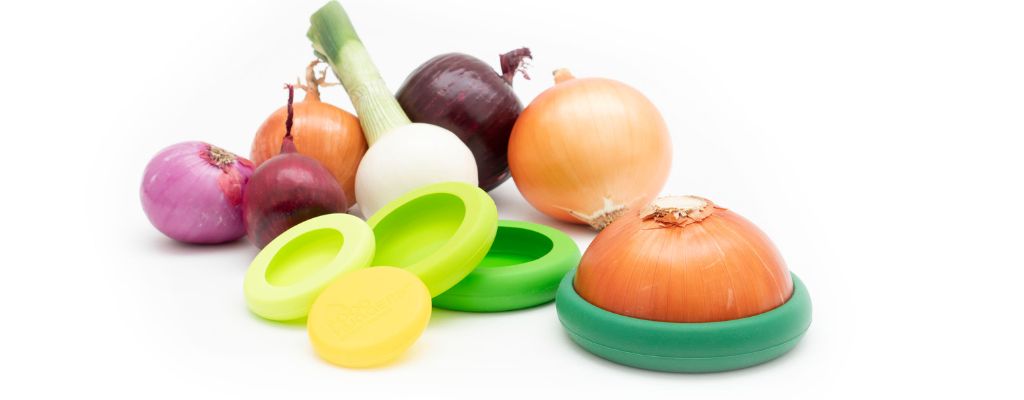Raw, caramelized, pickled or sauteed – humble onion bulbs can be enjoyed in countless ways. And no wonder. Used as a flavor base in most savory recipes around the globe, onions elevate even the most mundane dishes by adding a powerful umami punch, zing and subtle sweetness.
We know you want to prevent food waste at home as much as we do – onions included. In this article, you will discover 6 creative zero waste kitchen tips to prevent onions from going bad in your household.
How Long Do Onions Last?
Fresh whole onions typically last 2-4 weeks at room temperature — kept on the countertop or in a cupboard.
To prolong their shelf life up to 3 months, keep them in a cool, dry and dark place with good air circulation to avoid trapping the moisture that leads to spoilage.
How to Store Your Onions So They Last Longer
Found a great deal at the farmers market and decided to stock up? We suggest storing onions in containers like wooden crates, jute or wire baskets and reusable mesh or paper bags. We recommend avoiding plastic as it traps moisture and make a sustainable swap instead by opting for one of the plastic wrap free alternatives – like our Fabric Cuff Bag.

Pro tip: keep your onions at least a foot or two away from potatoes. While working together beautifully in a nourishing potato onion soup, spuds and bulbs aren’t friends when stored next to each other. The ethylene gas from onions speeds up the potato ripening, making them more likely to sprout or rot before you use them up. Likewise, the moisture released by potatoes may cause onions to leak or become slimy.
Storing the Onions in the Fridge
Storing whole unpeeled onions in the fridge in a cold and humid environment isn’t the best solution. They absorb moisture easily and may soften and spoil.
Instead, you can keep them:
- Peeled
- Halved (With the help of our signature eco friendly kitchen tools Food Huggers)
- Sliced or diced (in an airtight container or a Hugger Bag)

Brine and Dine With Pickled Onions
We’re slightly obsessed with pickled onions – especially red ones made with this recipe by Delish. Crunchy, sweet and tangy, they are great on tacos, salads, sandwiches and more. Plus, they’re packed with probiotics and digestive enzymes – improving your gut flora with every bite.

Use Them in Recipes
Thanks to their pungent flavor, onions are a fantastic way to add more depth to a dish. Here are some of the Food Huggers’ top picks:
1. French Onion Soup
Rich, comforting and hearty, this classic dish will keep you cozy and warm on a fall day. We love this recipe by Allrecipes.com because it’s simple and tasty as they come.
2. Blooming Onion
Battered and deep-fried, blooming onion isn’t exactly the healthiest dish – but it’s worth every calorie. We love to indulge now and then, especially with this recipe by Food Network.
3. Caramelized Onions
The deep, rich and sweet flavor of caramelized onions makes them a perfect steak, pizza or bruschetta topping. Best of all, they take no effort to make — especially if you follow this step-by-step recipe.
4. Homemade onion rings
Another bellowed classic, onion rings are a perfect balance between sweet and savory and crunchy and soft. Whether you go for old-fashioned deep-fried onion rings or lighter ones made in an air fryer – you can’t go wrong.
Serve them with burgers, chicken wings, veggie wraps or as a standalone dish with homemade healthy ketchup or sriracha-mayo on the side.
Onions As Natural Medicine
Onions aren’t just flavorful, but have fantastic health properties:
- Anti-inflammatory
- Anti-bacterial
- Gut-friendly
- Packed with vitamin C
- Decongestant (clearing the mucus)
No wonder they have been used in folk medicine as congestion, cough, and cold medicine for centuries. If you have some extra onions lying around, why not whip up this old-fashioned honey and onion cough syrup?

Ways to Use Your Onions Beyond the Kitchen
Onions aren’t just versatile in cooking. Check out these unexpected, but amazing non-food uses for your leftover onions.
1. Clean Your Grill
Few things are more annoying than grease build-up on a grill. Luckily, getting it clean is as easy as scrubbing the grill grates with an onion half. For best results, do it while the grill is still warm.
2. Remove the Rust
Rusty knives, forks and scissors will become a thing of the past thanks to the sulfenic acid in the onion. Simply rub the rusty areas with an onion half, rinse to get rid of the onion smell and dry quickly.
3. Use Onion Skins for Natural Dye
Looking for a natural fabric dye without any artificial chemicals? Onions are cheap and plentiful natural dye sources that give you lovely earthy colors – think yellow, golden, orange and brown.
(For step-by-step instructions visit The Spruce Crafts.)
4. Make a DIY insect repellent
Bugs hate the pungent-smelling compound allicin found in onions – making it a perfect choice for natural and organic insect repellent.
And making it is simple: blend two onions and a clove of garlic with a quart of water until smooth. Use cheesecloth to filter and pour the mixture into a spray bottle. There you have it – a nature-friendly insect repellent that will keep the pesky bugs away without harming your plants.
Final Thoughts
Onions are inexpensive and versatile vegetables with many practical uses.
Hope you enjoyed our zero waste kitchen tips for preventing them from going bad and generating less food waste at home.
As always, our small women owned and B corp certified business appreciates you reading our articles on sustainable living. Feel free to share this one with environment-loving people in your life.
And let’s keep in touch on social media. It’s where we regularly share news on our eco friendly kitchen tools, sustainable swaps, and zero waste kitchen tips.
